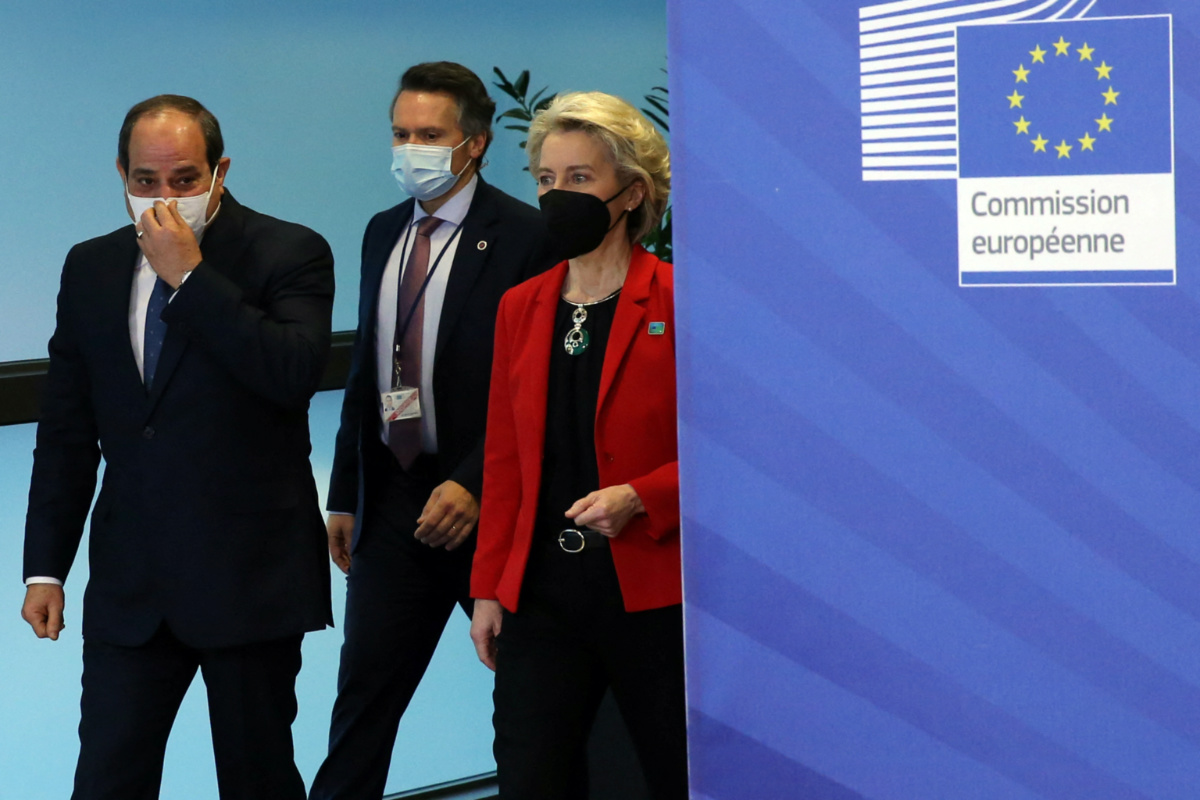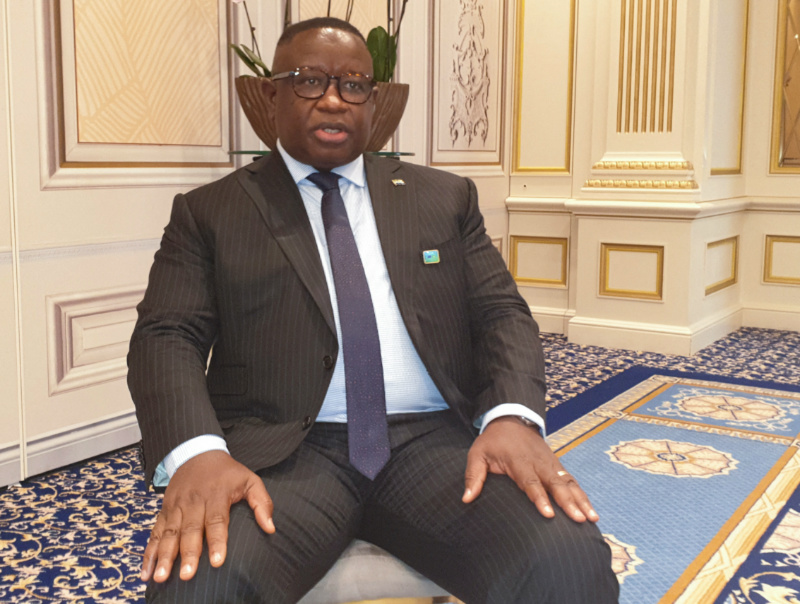Brussels, Belgium
Reuters
The EU welcomed more than 40 African leaders to Brussels on Thursday in an effort to reassert its influence on a continent where China and Russia have made hefty investment inroads, and where many felt let down by Europe’s COVID-19 vaccines rollout.
The European Union will offer several packages of support at the summit to bolster health, education and stability in Africa, and will pledge half of a new €300 billion investment drive launched to rival China’s Belt and Road Initiative.

European Commission President Ursula von der Leyen and Egyptian President Abdel Fattah el-Sisi arrive at the EU headquarters in Brussels, Belgium, on 17th February. PICTURE: Francois Walschaerts/Pool via Reuters.
But the meeting also takes place just as France and its allies fighting Islamist militants in Mali said on Thursday they would begin their military withdrawal from the country.
European and other wealthy nations were heavily criticised for hoarding protective equipment and later vaccines during the pandemic, with some African leaders saying the slow pace of donations could lead to “vaccine apartheid”.
AFRICAN LEADER ASKS EUROPE OF COVID RESPONSE: “ARE WE EQUAL?”
Sierra Leone’s leader challenged Europeans on Thursday to remember there are “human beings on the other side” in Africa who have been left behind in the unequal global response to COVID-19.
By the start of February, only 11 per cent of Africans were fully vaccinated against the coronavirus – far fewer than in richer parts of the world where vast and expensive inoculation campaigns have reached most of their populations.
“We feel left out,” President Julius Maada Bio told Reuters while attending the European Union-African Union summit.
“So at a meeting like this we really want to ask these critical questions. Are we equal partners in this? Do we consider there are human beings on the other side?”

Sierra Leone’s President Julius Maada Bio speaks during an interview with Reuters in Brussels, Belgium, on 17th February. PICTURE: Reuters/Phil Blenkinsop.
Many developing countries have called for intellectual property rights for COVID vaccines and treatments to be waived, but face opposition from rich nations, including many in the EU.
Bio said the pandemic was making it harder for already debt-laden African governments to provide for their people’s social needs and was also undermining security.
“It undermines African governments, it makes us look as if we don’t care for our people and this has security implications,” he said.
Sierra Leone’s West and Central African neighbours have seen a series of military coups in recent times.
Bio said there was no uniform cause for that, but he hoped the two-day gathering would address climate change, human rights and migration, as well as the dominant topic of the pandemic.
Bio spoke after France and military allies announced they would leave Mali after almost a decade based there fighting Islamist insurgents.
The Sierra Leone President said Mali should not be left as a haven for jihadists and launch-pad for attacks around the world.
The task was beyond the powers of countries in the region, he added. “We shouldn’t leave the security situation in the Sahara Desert in the hands of those few states. There should be a global effort, like was done in Afghanistan … in Syria.”
– PHILIP BLENKINSOP/Reuters
By the start of February, only 11 per cent of Africans were fully vaccinated against the coronavirus – far fewer than in richer parts of the world.
There was also dismay over Europe’s travel bans on South Africa after the Omicron variant was detected there late last year.
South African President Cyril Ramaphosa said he and other African leaders would raise the issue of intellectual property rights for COVID vaccines and treatments. Many developing countries want these rights waived, but face opposition from rich nations, including many in the EU.
Thorny issues
Tensions run deeper on other issues between two continents with colonial ties, including over migration flows and the erosion of democracy in several African countries, some of which have recently seen coups d’etat including Mali.
Frank Mattheis, an expert in regional studies at the United Nations University, said the summit would seek to highlight areas where cooperation is promising and avoid thorny issues.
The European Commission announced this week that the EU and the Gates Foundation would invest more than €100 million in the next five years to help set up an African medicines regulator to boost the continent’s drugs and vaccine production.
The race to establish the African Medicines Agency comes after the pandemic exposed the region’s dependence on imported vaccines.
Just over five per cent of medicines and one per cent of vaccines consumed by Africa’s population of 1.2 billion people are produced locally. The EU says it will provide support to help Africa produce 60 peer cent of the vaccines it needs by 2040.
Part of the funding for the AMA will come from €150 billion to be mobilised for Africa over the next seven years under the EU’s Global Gateway scheme.
Separately, the European Investment Bank announced on Thursday it would make available €500 million in cheap loans to African countries to strengthen healthcare systems. That credit line is expected to mobilise a total of €1 billion in private and public investments, the bank said.
W Gyude Moore, a senior policy analyst at the Center for Global Development, welcomed the investment pledge and said he hoped it would start a partnership of true equals.
“But there is a long history of unfulfilled promises like this when it comes to the EU and Africa, so the African Union, while cautiously optimistic, will remain sceptical until this pledge is converted into projects on the ground.”
– Additional reporting by FRANCESCO GUARASCIO in Brussels, Belgium; DUNCAN MIRIRI and KATHARINE HOURELD in Nairobi, Kenya.






